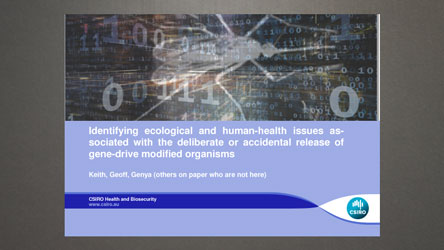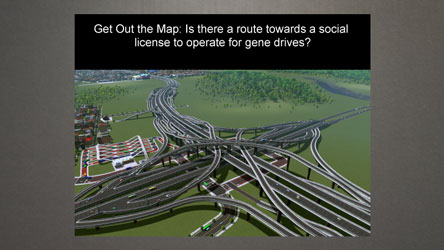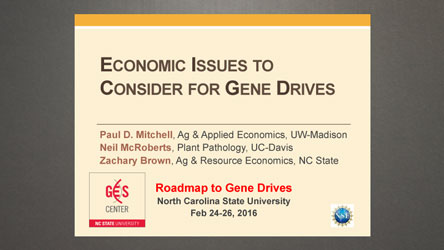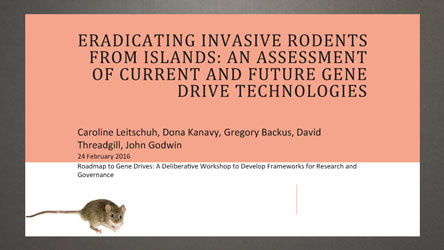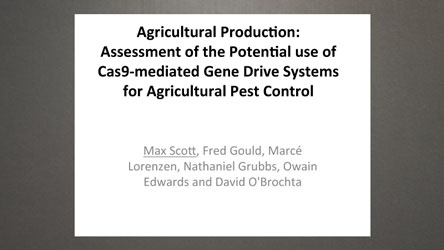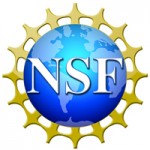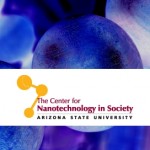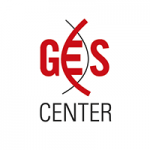February 24 – 26, 2016
Impetus for the Workshop
In an era of forward thinking and innovation, the world faces more complex and thought-provoking problems than it has ever dealt with before. These problems sometimes are multi-faceted and most of the time cannot be solved by exploring one avenue of thought. The constant advancement and progression of biotechnology brings with it a multitude of these unique difficulties. Gaps exist in our knowledge in the ever growing world of these technologies. Gene Drives, or genetically modifying any species’ genetic makeup for a specific desired outcome, present one example of this kind of biotechnology. We are uncertain of possible risks that come with the perceived benefits of this biotech and governmental regulatory policies have not kept up with the technological developments. Also, ethical lines have yet to be fully delineated as research pushes boldly forward into the future, spanning across various disciplines. This NSF sponsored gene drive workshop will attempt to fill these gaps in our understanding and solve some of these problems by constructing efficient and creative solutions across all disciplines of academia.
One of the reasons the GES Center at NCSU wanted to host this workshop is because the technology has become the center of debate regarding ethical principles like population control of certain species, genetic modification of foods we consume and genetically altering the physical traits of our offspring, Gene drive technology, however, is also used in many medical cases and in many attempts to combat disease. With so many differing perspectives and opinions on gene drives, it was clear to us that more conversation is needed to facilitate a structure in which responsible regulations are fleshed out for the technology.
Sponsored by National Science Foundation, the GES Center at NCSU, the Nanotechnology and Society Center at Arizona State University, and Synberc, this gene drive workshop will encompass some of today’s greatest international minds and innovative thinkers who come from a number of disciplines and academic pathways. These visionaries will use the knowledge of their respective disciplines to engage in discourse about effects of gene drives through the eyes of their individual fields. The goal of the workshop is to take these interdisciplinary perspectives and develop more information and strategies that can be used to improve public knowledge on the topic of gene drives. The GES Center will be a gateway where the public can then gain access to this information and make informed decisions regarding the topic.
See workshop articles from the Journal of Responsible Innovation
Project Description
Overview
The science of advanced biotechnology is moving faster than governance considerations and actions. For example, some second generation, genetically engineered organisms are not subject to formal regulation prior to environmental release. Gene drives are a subset of second generation genetic engineering technologies that are being developed with the aim of moving synthetic gene constructs into wild animal populations to protect, suppress or eliminate them. Recent legal and policy scholarship has focused on the need for governance to “keep pace” with technological innovation in multiple domains, including biotechnology. However, we currently lack a broad evaluation of the potential ecological, political economy, ethical, and other issues to guide research and development of gene drives. This workshop will serve to fill this gap.
Agenda
Intellectual Merit
The invitation only workshop will “unpack” gene drives for more nuanced and productive conversations about governance. Participants will develop a draft typology of technologies, purposes, and contexts of gene drives, and a framework of issues and research needs for three key areas: ecological risk analysis, political economy analysis (including governance regimes), and ethical analysis. In order to cover a range of technologies, purposes, and issues, but yet be specific enough for productive dialogue, three case studies will be used to anticipate the socio-ecological-economic-ethical issues associated with gene drives. Integration of the natural and social sciences will be achieved through broad multi- disciplinary participation and thinking about the cases and the systems in which they are embedded. We propose equal representation of disciplines drawn from four meta-categories—genetics and molecular biology; ecology and ecological modeling; political economy; and STS & ethics. Practitioners and experts from government, NGOs, and industry will be included. Collaborative systems mapping will be used as a tool to assist integration of natural, social, and ethical variables, as it has been shown to be effective in creating an environment where complexities and uncertainties can be better seen and understood, and where participants are more willing to open up to alternative perspectives. The combination of the topic, approach, and outputs of the workshop make it unique, and it will contribute to deeper intellectual understanding of gene drives in societal contexts.
Broader Impacts
The structure of this invited only workshop will be designed to engage participants in working together to generate analyses and summaries useful for future decision- and policy-making about gene drives. Coming out of the workshop, there will be:
- A good working draft of a technologies typology;
- Issue analysis frameworks in ecology, political economy, and ethics that are specific to the cases and more general;
- A list of key research needs for cases
- System maps for the cases.
Papers will be drafted by workshop presenters and disseminated prior to the workshop. Following the workshop, papers will be finalized for publication in a special journal edition. A summary article will be published by the program committee that compares issues and system maps across the case studies and summarizes the key findings of the workshop. The program committee will also draft a shorter piece submitted for a high profile venue, such as a Nature or Science commentary. An editorial for major newspapers describing the technologies, uses, and issues in public-friendly terms will also be drafted to assist in broader public conversation. Dissemination of the workshop results—including the technologies typology, system maps, issue frameworks, and research-needs summaries—will serve to guide future research, innovation, and oversight of gene drive systems.
In order to engage younger and under-represented (UR) (including gender under-represented) scholars, each program committee member will be expected to recruit a Ph.D. student or other junior- scholar to attend the meeting (i.e. at least 8 of the 50 attendees). UR students and junior scholars will be supported to attend by the grant’s travel budget.
Papers
Journal of Responsible Innovation | Roadmap to Gene Drives: Research and Governance Needs in Social, Political, and Ecological Context |
Gene drives and the expanding horizon of governance
|
Mapping research and governance needs for gene drives
|
A roadmap for gene drives: using institutional analysis and development to frame research needs and governance in a systems context
|
Harnessing gene drive
|
Gene drive to reduce malaria transmission in sub-Saharan Africa
|
Anticipating complexity in the deployment of gene drive insects in agriculture
|
Agricultural production: assessment of the potential use of Cas9-mediated gene drive systems for agricultural pest control
|
Developing gene drive technologies to eradicate invasive rodents from islands
|
Identifying and detecting potentially adverse ecological outcomes associated with the release of gene-drive modified organisms
|
The roles of ethics in gene-drive research and governance
|
Economic issues to consider for gene drives
|
Regulating animals with gene drive systems: Lessons from the regulatory assessment of a genetically engineered mosquito
|
Anomaly handling and the politics of gene drives
|
Gene drives and the management of agricultural pests
|
Committee on Gene Drive Research in Non-Human Organisms: Recommendations for Responsible ConductSummary of Consensus Report, Gene Drives on the Horizon: Advancing Science, Navigating Uncertainty, and Aligning Research with Public Values (2016). Washington, DC: The National Academies Press. doi: 10.17226/23405. Download |
Presentation Slides
Workshop Videos
| Title | Link |
|---|---|
| Interview with Jennifer Kuzma | Video |
| Interview with Kevin Esvelt | Video |
| Interview with Aleksandra Malyska | Video |
Leadership Team
Principal Investigator

Dr. Jennifer Kuzma
Center Co-Director
Professor, Public & International Affairs
Email: jkuzma@ncsu.edu
Co-Principal Investigator

Dr. Fred Gould
Center Co-Director
Professor, Department of Entomology
Email: fred_gould@ncsu.edu
Program Manager

Sharon Stauffer
Center Program Assistant
Email: sastauff@ncsu.edu
Research Assistant

Caroline Leitschuh
2013 IGERT Fellow, PhD Student
Biological Science
Email: cleitsc@ncsu.edu
Program Committee
Along with the PI and Co-PI, the following people are serving on the Program Committee:







Author Attendees

Paper Description: Human Health: Insect/human disease transmission. Technology assessment for control of human diseases such as malaria, dengue, and trypanosomiasis.

Paper Description: Agricultural Production: Technology assessment for agricultural pest control, for example 1) Drosophila suzukii on fruit; 2) Screwworm; 3) Diamondback Moth, or 4) Maize Weevil.

Paper Description: Typology of gene drive technologies and uses, building on the categories and features described in Esvelt et al. 2014.

Paper Description: Skeletal system maps for each of the case studies putting in place the important stocks and flows in areas of risk, economy, ecology, and principles (justice, trust), but leaving the details for further mapping at the workshop.

Paper Description: Political and policy issues associated with the 3 cases and beyond, and begin a framework for assessment and identifying research needs.

Paper Description: Framework for ethical analysis of the 3 cases and beyond, and a framework for identifying research and dialogue needs.

Paper Description: Identify major ecological and human health issues associated with the cases, develop a framework for categorizing types of harms, and identify research needs

Paper Description: Economic issues associated with the 3 case studies and beyond, and begin a framework for assessment and identifying research needs.

Paper Description: Conservation: Technology assessment for invasive rodent control on islands

Paper Description: Integrative thinking across biology, policy, and ethics.
